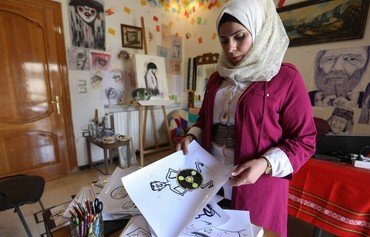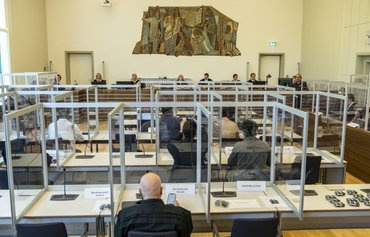THE HAGUE, Netherlands -- The Netherlands and Canada dragged Damascus to the International Court of Justice (ICJ) over allegations of torture, the first such case in Syria's war, the top United Nations (UN) tribunal said Monday (June 12).
The case accuses Syria of breaching a UN convention against torture by mistreating and disappearing detainees, committing sexual violence -- including against children -- and even by the use of chemical weapons.
It is the first time the Syrian regime has faced international justice over the conflict, which erupted after President Bashar al-Assad cracked down on protests in 2011 and which has killed more than 500,000 people.
Canada and the Netherlands said they had asked the ICJ to take urgent measures including ordering Syria to "cease the torture and cruel, inhuman and degrading treatment of its people".
![A satellite image shows Syria's military-run Saydnaya prison, one of the country's largest detention centres, in 2017 -- the year the United States accused Syria of building a prison crematorium to destroy the remains of thousands of murdered detainees. [Handout/various sources/AFP]](/cnmi_di/images/2023/06/13/42564-syria-regime-prison-600_384.jpg)
A satellite image shows Syria's military-run Saydnaya prison, one of the country's largest detention centres, in 2017 -- the year the United States accused Syria of building a prison crematorium to destroy the remains of thousands of murdered detainees. [Handout/various sources/AFP]
"There can be no sustainable peace and lasting reconciliation in Syria without ... justice for its victims and survivors," Canadian foreign minister Melanie Joly and her Dutch counterpart Wopke Hoekstra said in a joint statement.
Judges at the ICJ are expected to hold the first hearings on the case in the near future but the court did not give a date. Any final judgment could take years.
Abhorrent, inhumane treatment
While there have been individual war crime cases linked to the Syrian conflict in some countries, there has long been frustration in Western capitals at the lack of any wider plan for international justice.
The Dutch first launched a bid in September 2020 to hold Syria responsible for alleged breaches of the UN Convention Against Torture, to which Damascus is a signatory. Canada joined the case the following March.
The Syrian regime had been "stalling" on efforts to arrange talks with the Dutch and Canadians, who then decided to refer the matter to the ICJ, a diplomatic source said.
The court was set up after World War II to deal with disputes between UN member states, usually based on alleged violations of international treaties.
The Dutch and Canadian case said Syria "has committed countless violations of international law" since 2011.
It alleges "abhorrent treatment of detainees, inhumane conditions in places of detention, enforced disappearances, the use of sexual and gender-based violence, and violence against children".
The violations "also include the use of chemical weapons which has been a particularly abhorrent practice to intimidate and punish the civilian population".
They asked the ICJ to order Syria to halt "arbitrary detention" and release unlawfully detained people, reveal the burial sites of people who died in detention, and preserve any evidence including medical records, they said.
'Long road' to accountability
Hoekstra, the Dutch foreign minister, said the case was a "major next step on the long road to that goal" of providing accountability for atrocities in Syria.
There was no immediate reaction from Damascus.
Syria has repeatedly denied the use of chemical weapons, although the Organisation for the Prohibition of Chemical Weapons (OPCW) has found that the Syrian military has repeatedly used them against its own people.
The case is the first of its kind before international courts.
The International Criminal Court (ICC), a war crimes court which is also based in The Hague, has been unable to deal with Syria as it never ratified the Rome Statute, the tribunal's founding treaty.
Russia and China blocked a draft UN Security Council resolution to refer the situation in Syria to the ICC in 2014.
US envoy to the UN Linda Thomas-Greenfield in March 2021 accused Russia of seeking to stymie efforts to hold the Syrian regime accountable for its use of chemical weapons.
"Russia has defended the al-Assad regime despite its chemical weapons attacks, it has attacked the professional work of the OPCW, and it has undermined efforts to hold the al-Assad regime accountable for its use of chemical weapons and numerous other atrocities," Thomas-Greenfield said.
The return of al-Assad to the international fold in May with his attendance of his first Arab League summit in more than a decade has brought the issue back to the fore.
France's foreign minister in May said al-Assad should be put on trial following "hundreds of thousands of deaths" and "chemical arms use" during the conflict.

![Members of the Syrian Organisation for the Victims of War display pictures documenting the torture of detainees inside the regime's prisons and detention centres, on March 17, 2016, in Geneva. The photographs were taken by a former military policeman of the Syrian army, known as 'Caesar', who defected and fled Syria in 2013. [Philippe Desmazes/AFP]](/cnmi_di/images/2023/06/13/42563-Syria-regime-torture-600_384.jpg)





